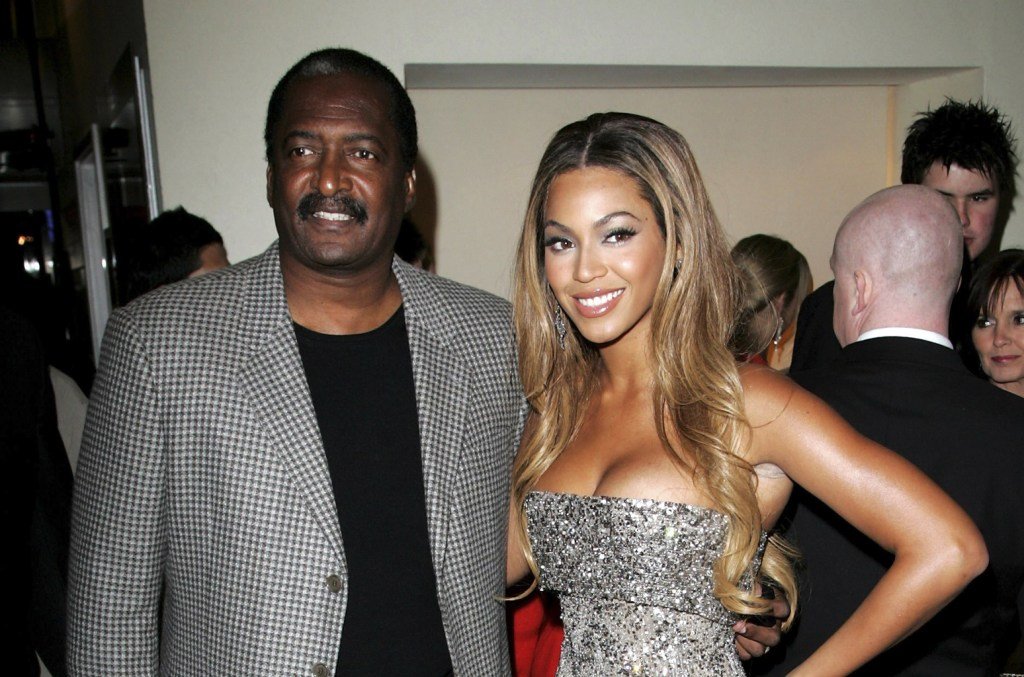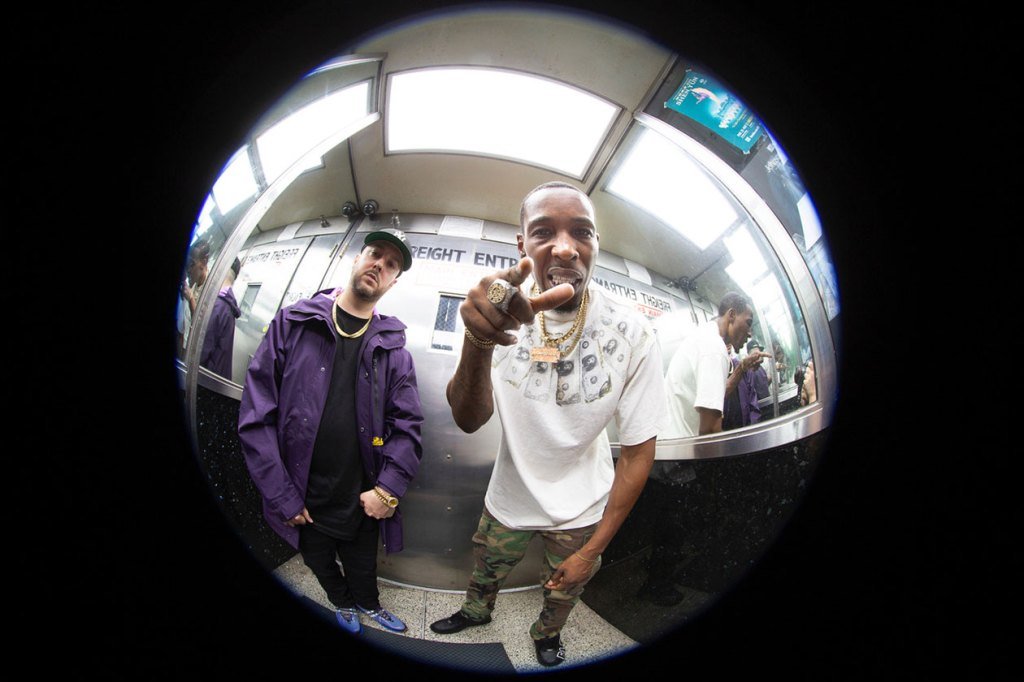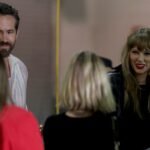Rome Streetz and Daringer have been Griselda Records’ secret weapons.
Rome, who reps Brooklyn signed to Westside Gunn’s imprint back in July of 2021 and released the impressive album Kiss the Ring. On that project, is a song entitled “Tyson Beckford” where he and the label’s in-house producer Daringer first linked up. They then began working closely together because the Buffalo producer’s Queens studio is a hop, skip, and a jump from Rome’s Brooklyn apartment.
“When I ain’t doing s–t, I go to the studio,” Rome told me in a Billboard conference room. “I was literally there everyday for months just cookin’ up, just vibin’, listening to beats.” Daringer would already be working and he would play Rome beats until one of them caught his attention. “By the time he pulled up, I would have either something started or I would have part of a beat and then I would just be throwing records on until something something landed,” the Griselda beatmaker added.
What resulted from those sessions is their first collab album Hatton Garden Holdup named after London’s diamond district. Rome spent some of his high school years across the pond and would come back to NYC during school breaks. But it wasn’t until they were out in London doing show’s with Griselda mainstay Conway the Machine that they got the idea for the short film which then turned into them naming the album, and interjecting London-based skits and samples into the final product to bring everything full circle. “It was easy to make that the theme once the movie was part of it,” Daringer said. “I felt like we had to even down to the name.”
The duo came by the Billboard office in midtown Manhattan to talk about the making of the album and the film which included some of Rome’s childhood London friends that he has continued to keep in touch with.
Check out our talk below.
We might as well start with the short film you guys recently released. How did that idea come about? Like, what made you guys want to do a movie?Where in the process of the album. Did the in the did the idea come about to do it, to do a movie?
Rome Streetz: We were pretty much around 80 percent done with the album once we shot the movie. And it just hit me, like, ‘Yo, we should do a movie. Because [Coach] always wants the videos to be like little movies. Most of the videos Coach directs have kind of like a movie-esque vibe to them. We did “Chrome Magnum,” we did “Shake and Bake.” So, we’re like, ‘You know what? Let’s just do it, I’m saying. And because it’s not a Griselda album or something Westside Gunn is spearheading, we just wanted to do more than you would get from a Griselda album.
That’s what it really was: How can we just turn this sh—t up another level? How can we do something that most motherf—kers in this realm are not doing? Everybody drops the album, one or two music videos, do a couple interviews, drop a tape, CD, vinyl, and then it’s on to the next sh—t. Who’s actually doing a movie?
Hatton Garden is essentially London’s diamond district, there’s British samples from movies and interviews. When did the London theme come about?
R.S.: The London theme honestly, came from the movie. You know, I’m saying, like, once we did the movie. Then we started adding the London sh—t.
Daringer: It was easy to make that the theme once the movie was part of it. I felt like we had to even down to the name.
Were you guys out there to perform or were you there specific all to shoot the movie?
R.S.: Earlier in the year, I was out there performing with Conway, and then it just kind of came about like that. And also because I used to live in London when I was a teenager for a couple years, so that was like a throwback to that time.
You were born in London, right?
R.S.: I was born in London, but I came to New York when I was like one. Then I went back to London from like 14 to like 17. It wasn’t for the whole year, I would go to school out there, and when school was done, I’d come back to New York.
You still have family and friends out there?
R.S.: Yeah, I got family, I got friends out there. A lot of my friends are into the same sh—t that we into. I communicate with them all the time: Facebook, Instagram, WhatsApp. So, I was like, how canI incorporate that into what I’m doing? How can we mix this London sh—t. A lot of my homeboys were in the movie. The part when we were in the alleyway talking? None of them were actors, they were all my homeboys.
Daringer, your name is synonymous when it comes to Griselda, so it was cool to see you, be more visible now. Is that something that you want to do moving forward?
D.: Absolutely, especially with me, just like, kind of flourishing more as an artist now too. It was always just me producing behind the scenes for all these years. Now is the time where I need to start moving as an artist. I feel like this was the perfect time to really start being outside and actually being seen. I felt like this was a perfect opportunity for that, for sure.
You guys have been working together since Rome has been with Griselda, but what made you want to do a tape together?
R.S.: We did that one song on Kiss the Ring, “Tyson Beckford.”
D: Then he pulled up to my apartment.
R.S.: The first song we did was the joint with Cormega.
D: Right.
R.S.: But Mega wasn’t on it at first. We did that joint, like, ‘This sh—t is hard.’ And what we gonna do? We just kept cooking up. His studio is right by my crib. We kept making stuff and was like, “We got a lot of songs we might is well do an album.”
And you live in Queens now. I guess it made it easier for you guys to kind of connect for this album. Or did that matter?
R.S.: His studio is on the border of Queens and Brooklyn and I live like 5-10 minutes away. When I ain’t doing s—t, I go to the studio, I was literally there everyday for months just cookin’ up, just vibin’, listening to beats.
So, you guys worked on most of the album together? Did you already have a pack of beats or were you making them on the spot as you guys were cookin’ up?
D: I made the majority of them on the spot. Maybe I’d have some drums started by the time he got there, or a sample idea, and I was kind of just trying to figure it out. By the time he pulled up, I would have either something started or I would have part of a beat, and then I would just be throwing records on until something something landed.
You living in Queens makes sense now because one of your first tapes outside of Griselda was with Meyhem Lauren.
D: Yeah, I traveled with Action when I first moved there, worked with Meyhem, getting tight with them, and being able to actually stay in New York now because I’m doing enough things, and then that was when the Shady deal happened. So, luckily I was able to stay in New York, but it’s funny because I didn’t have a studio when we “Tyson Beckford,” I was still just making beats out of my apartment. We made the first song in my apartment, and my goal was to always eventually just get a studio in New York, so it just happened to work out that it was close to where he was living. I feel like that definitely helped out with the whole process, it made things a lot easier.
What I found interesting about this tape was that some of it sounds different from the usual Griselda stuff, especially the track with ScHoolboy Q. I wasn’t expecting that beat to sound like that. Was that on purpose?
R.S.: Honestly, it was just energy. Whatever he was throwing at me. I wasn’t being picky. Daringer is Daringer, so it’s all gonna hit. We’re just gonna make sh—t until we feel like we got what we need. You know, we still got a lot more songs left over. And then the ScHoolboy Q record was so different and he wasn’t on it at first. He happened to tap me on Twitter. I was in the studio with Q, and he heard it, and wanted to get on it. The song that Daringer made for Q was the one that Conway was on. He heard that first, like “Yo, this is fire.”
But then he went to the bathroom, and then the engineer was just like, “Yo, play me some s—t.” So, then I just started playing him songs, and when I played him that one, Q just so happened to walk in the room and was like, “What the f—k is that? This is it. This is the one I wanna get on.” I had a second verse on it, so I had to call Daringer, like, “Oh s—t, yo, I need you to f—king send me this s—t right now without the verse on it. Luckily, I had to beat in my phone. That’s what saved it.
So, you and Q just happened to be in the same studio, or you linked up specifically to chill and record?
R.S.: I did an interview in Portugal when I was on tour and the interviewer asked me who is somebody I would like to work with. think I named, like, three other people, but then I named ScHoolboy Q, so then eventually the interview just ended up on Twitter, and then he seen it, and then he quote tweeted it, like, “Yo, send it.” I hit me back and he was like I could either send him the record or just pull up to the lab. So, I pulled up and went to L.A. That’s how it happened.
I’m always fascinated by this, especially since you guys worked on this together. Today, nobody does that anymore. They send a pack and then you send verses back. Can you tell us the difference between collabing over email versus being in the studio with each other?
R.S.: With me? At one point, I used to feel like I work better on my own time. Sometimes when you in the studio, you get boxed into the time constraints. I used to feel like I’d rather not put my creativity in a time constraint box, like I feel like I work better when I just have my own time. So, a lot of my other s—t was more so just like, you could send me a beat, I’ll cook it up. But this one was more of a challenge. How much can I write on the spot? I hear the beat, I’m going in right there.
I used to think that I write better rhymes outside of the studio, but this pretty much proved to me that it don’t matter, you got the glow. I like this process because it’s more of a stream of consciousness. It’s more of just your energy right then and there. When somebody sends you a pack, you probably write half a verse today and then finish it two days later, and you may not have the same energy.
I like working on the spot because it makes me better, it’s like a challenge. You’re capturing the energy right there. Your creativity dies when you’re too comfortable, you start leaning on s—t. I just feel like I need to challenge myself.
D: That was the goal of me getting the studio to begin with. I don’t have control over what happens after I send the beat a lot of times. What helped with this album is that we got to revisit and work on the songs more, I guess, post production, or whatever you like to call it. It’s got to spend more time on the songs and structure them and drops, you know, and just the skits and outros, intros. All that extra stuff that maybe a lot of times I don’t add that when I’m just making.
The bells and whistles, just to make it perfect.
D: The email stuff is always like an unfinished idea that ends up becoming a song. That was definitely the goal of me getting the studio and wanting to make a record like that, and being able to spend the extra time for sure. We got to do the s—t the right way. I’m happy with my investment, just because of that.
Yeah, them all habits die hard. Rome, do you punch in?
R.S.: Nope, at least I try not to. I’m not gonna say I don’t, sometimes you have to for continuity. But the reason why I don’t like to punch in is because if I can’t spit the rhyme straight through, I can’t perform it. If I’m punching in every bar, how’s that gonna translate on the stage? I gotta be able to say the rhyme straight through. I gotta be able to record it in one whole take, if I can perform it.
Yeah, because that’s like the norm now, especially with the younger rappers.
R.S: When you see them on stage, they’re not even f—king rapping. They just let the song play, and they just jumping up and down, ad-libing their own vocals, because they can’t even say the sh—t in one breath because of the fact that they had to punch it.
Was this the first project that you recorded in full there?
D: Yup, it’s personal space. I’m not sharing it with anybody and no one is going in and out besides me. We probably wouldn’t even have that ScHoolboy record had we not been in the studio. Because it was a beat that started with just drums, and me listening to records and not overthinking. It was literally just like the first thing that landed that just sounded good with the drums and then we kind of just built on it. We did a bunch of the records like that.
R.S.: Sometimes it’d be better that way. If I wasn’t there, that’ll probably be one he made that he didn’t like. But I heard it and was like, “Whoa, whoa, whoa, whoa, what the f—k is that? Sometimes you might just overthink it and be like, “Nah, this ain’t it.” The producer might want to do something, but then the rapper might hear something that the producer don’t hear. It’s like, “Nah, the rhyme could go crazy, right here. Don’t even add nothing. Keep it just like…” You know what I mean? That on the spot, energy is good.

Rome Streetz and Daringer
Photo Rob
How much input did you have on the beats?
R.S.: A lot, but I let Daringer do his thing. As far as the samples, it wasn’t like, “Pick this,” because he’s got 1000s of records. I don’t know what the s—t sounds like until he puts it together. Like, I don’t imagine you.
You work with The Alchemist closely too. He be digging obscure s—t. I’d imagine you do the same.
D: I’ve been on the same wave too. way. So, of course, when we got together, we could share ideas. I never felt like he thought I was gonna come in and just take his ideas either. So we always, somehow didn’t really run into the lot of the same things. We like a lot of the same music, a lot of the same records. But luckily, we didn’t run into too many instances where it was, like, we’re using the same sh—t. Yeah, the approach is a little different.
So, how’s that been for you, man? Now that you moved from Buffalo essentially into the industry for lack of a better term.
D: Not too many producers ever came out of Buffalo. I could only think of one off top that really flourished. Emile Haynie. And he took a different approach. He was doing Lana Del Rey and Mark Ronson. He’s worked on pop records, He did stuff with Ghostface and D.I.T.C. early on. He was around, but he definitely chose the pop route. So for me to be able to come up and stick with this style of rap, it feels dope. I always had the vision, but to actually come out of Buffalo and be able to move to New York City and be able to make a living from it? That was a big accomplishment.
How did you get affiliated with Griselda?
D: It’s crazy, we were bringing up Twitter before. There’s a small underground network that was going on in Buffalo at the time, so if you’re into that scene, we’re all going to run into each other at some point. I was a DJ at the time and I was trying to make beats on the side eventually. I was doing the DJ thing, playing showcases and playing rap records at a spot on Thursdays. I was a little bit younger, so I came in a little late, but I ended up meeting Gunn and Benny, and Gunn ended up just disappearing and then hit me on Twitter years later.
It was pretty much like, “Remember me, I’m about to put out an album. You got any beats?” And I was like, what Do you remember what year it was? 2014? HWH1. And that was the only original record on that tape.The rest of it was just like beats that he got, that he picked, that were already produced songs. That was the first one that we did, “Mess Hall Talk.” It was a little bit faster than a lot of the stuff that we would do down the line too.
He had the idea to start slowing the s—t down. Naturally, when we start pitching the music down, everything gets slower. I didn’t have Ableton and certain things at the time to maintain the tempo. That’s kind how the records and beats started getting slower, like 70 bpm, 60 bpm, type stuff. And he was coming from Atlanta at the time too, so you could tell there was some influence there. He kind of wanted to blend in the A with this type of rap, but with these tempos, with the samples pitched down, and it sounds like some chopped and screwed s—t.
Man, that makes sense. I never put those things together.
D: At least, I feel that way. That maybe was part of the reason why we were pitching it down to a certain speed. Also him still living there. Conway spent a bunch of time there. Benny spent a bunch of time there, so really Atlanta had a big influence on the whole s—t, surprisingly. The fact that he would travel all the way from Atlanta to Buffalo, he would drive a lot of times too. That’s not an easy drive. They would come to my apartment at the time, we recorded everything in my living room. Eventually, Conway stayed with and we started working on Reject 2. We ended up making two full records because he was staying with me the whole time. Looking back, making all that in my living room at the time was crazy, and the fact that Gunn was taking all these trips back and forth from the A to lock in made it even more special.
What else you got going on or planned. Anything you could talk about?
R.S.: I got an album with Conductor — probably two albums worth of music. I got sh—t with V Don. I got s—t with Muggs, Futurewave. I did a mixtape with Real Bad Man. I got a lot of sh—t.
D: I want to do a compilation featuring a bunch of different artists on it. That’s always been a thing that I wanted to do. I think I’m going to end up doing a couple of them and make a series out of it. I got music with Meyhem still, so we’re probably gonna do a follow up. Maybe one day me and Bronson will do a full length. I did a handful of the records on that last album. So hopefully one day we could tap in and do a full length. Reject 2 is turning 10, so maybe Reject 3 with Conway in the next year or two. I’m really just focusing on me as an artist.
I’m sure you want to show off your versatility, because I think you kind of did that with this tape.
R.S.: One thing I can say, when it comes to picking the beats, I was purposely steering away from certain type of beats only because fans are used to hearing that. it’s like one No, rather than being a whole album, I kind of knew what to expect, but then the project was still about to surprise me.
D: We definitely worked on the sequence for a while and put that puzzle together. I feel like, once we got the songs in a specific order, we were able to start adding the skits and gluing it all together.
R.S.: That’s the one benefit of working with one producer. You’re able to make all the songs flow into each other. I’m not saying you can’t do it with multiple producers, but it’s a little bit more difficult. You would literally have to get all of them people in the room at the same time to orchestrate that.
Why do you like working with one producer?
R.S.: I like to do one producer because it’s just cohesive. Sometimes when you have a bunch of different producers on one tape, you can’t really get a lot of the post production. I’m a fan of post production. Sometimes when I get beat and rap over it, when I play the song back, it sounds totally different. It’s easier to make intros and outros. If I’m getting packs all day, it’s harder to get 10 different producers to agree on the overall sound. One producer might like the mix on it, but then the other three might not like it, so then you gonna have to re-mix that song to go with that song.It could get crazy. I like working with one producer because you can kind of maximize the sound. You can get the most out of it, the producer can sit with it.
You should’ve did a British accent on one of the songs.
R.S.: [Laughs.] I probably have to go back to London for a couple years to get that sh—t down pat.
Were there any British movies or TV shows that inspired the samples and skits? I know the short was inspired by Snatch.
R.S.: Probably that that interview with the road man, that s—t funny as hell.
D: I watched things like Layer Cake to get the gist of it which sent me into a rabbit hole. There was a few joints from the ’70s that I was hoping to sample, but basically just ended up watching them to catch a vibe. We used something on “Starbvxkz” that we added at the last minute, pretty much when we were doing the video. Definitely some influence there.
You guys planning on going on tour? London definitely has to be a stop, right?
R.S.: They’re not going to let me live if I don’t. That’s the main place that I have to do a show.













